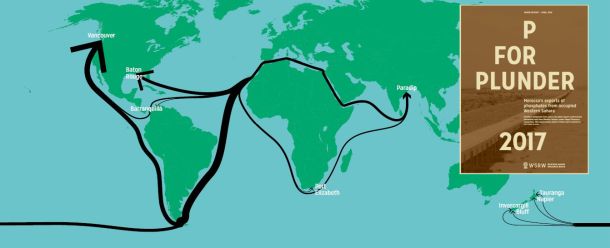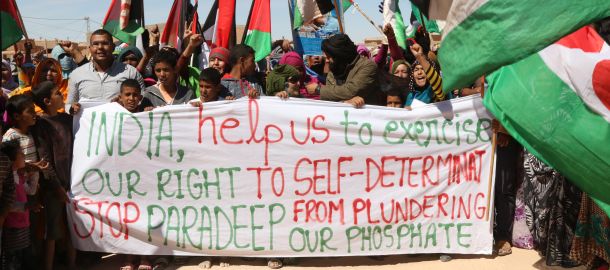
"There's no such country called Western Sahara," Incitec Pivot said to Australian Associated Press today. The statement follows intervention by former Australian senator in the company's general assembly, protesting the trade.
Read also press release: Australian Superphosphate not so super
Western Sahara has been treated by the UN since the beginning of the 60s. Still the CEO of the Australian fertiliser company Incitec Pivot, Julan Segal (right) denies its existence. Although he supports the Moroccan occupation of Western Sahara by calling the occupied area "Moroccan", and although his company finances the occupation by purchasing its phosphate rock, he claims to Australian Associated Press not to be involved in politics.
See story by Australian Associated Press, published In Sydney Morning Herald today.
Shareholders approve Incitec 20-1 split
September 5, 2008
AAP / SMH
Shareholders of explosives and fertiliser maker Incitec Pivot have overwhelmingly approved a share split of 20 for one.
The share split will apply to shares held as at 1900 AEST on September 23.
The total number of fully paid shares in Incitec will increase to about 1,217,230,560 from 60,861,528.
"It (the share split) is intended to benefit shareholders by lowering the nominal value of shares, so that the affordability of the shares to retail investors will be increased and facilitate the introduction of a dividend reinvestment plan for Incitec Pivot shareholders," chairman John Watson told a general meeting of shareholders.
"We are proposing to introduce a dividend reinvestment plan in response to requests from shareholders.
"Shareholders will be invited to participate when the reinvestment plan is established which, we expect, will be in time for the year's final dividend."
Incitec shares were $5.97 lower at $135.14 at 1534 AEST on Friday.
Normal trading in the Incitec Pivot shares on a post-split basis will start on October 1.
Incitec shareholders also approved a resolution which Mr Watson said was a technical one required under the Corporations Act and by the company's debt finance providers.
"This resolution seeks shareholder approval for various Dyno Nobel subsidiaries, which are now owned by Incitec Pivot, to give financial assistance in relation to Incitec Pivot's acquisition of Dyno Nobel and for other purposes by becoming guarantors to those facilities," he said.
Incitec completed its $2.6 billion takeover of explosives firm Dyno Nobel about three months ago.
Mr Watson said the effect of the resolution was to join all of the components of the new business, including Dyno Nobel, so that those assets could
be jointly used as security for borrowings.
Mr Watson also told shareholders that the company was formally reviewing the competencies, skills and attributes of the Incitec board.
"We expect that process will be completed prior to the AGM (annual general meeting)," he told shareholders.
Friday's meeting by Incitec shareholders again attracted a tiny demonstration outside from the Australian Western Sahara Association (AWSA)
The AWSA is asking that Incitec and other fertiliser companies put on hold imports of phosphate mined in the Western Sahara, which the AWSA claims is being sold illegally by Morocco.
The AWSA says Morocco claims sovereignty over Western Sahara but is an "occupying power" that is selling phosphate from the Western Sahara without the consent of the Saharawi people.
Former Democrats senator Lyn Allison, who was a proxy for an Incitec shareholder, asked Mr Watson during the meeting if the board had considered the risk of importing phosphate from an "occupied country", Western Sahara.
"These transactions with occupied counties are considered illegal in international law," Ms Allison said.
Mr Watson said he was happy to engage Ms Allison in the matter, but the meeting was not the appropriate time.
Incitec chief executive Julian Segal told reporters after the meeting that Incitec imported phosphate from Morocco.
"There's no such country called Western Sahara," he said.
"We import phosphate rock from Morocco. Some of that rock would come from Western Sahara.
"What is important is we are not politicians, we are running a business - what we need to do is comply very clearly with the laws of the countries in which we operate, and I can assure you that we are absolutely and totally and utterly complying with the laws that are regulating this kind of situation."
Mr Segal also said that demand for fertiliser would continue to be very strong given strong global demand for food.
"And therefore the price levels that we're seeing at the moment, give and take, I think is sustainable for the foreseeable future.
New report: Western Sahara phosphate trade halved
The export of phosphate rock from occupied Western Sahara has never been lower than in 2019. This is revealed in the new WSRW report P for Plunder, published today.
New report on Western Sahara phosphate industry out now
Morocco shipped 1.93 million tonnes of phosphate out of occupied Western Sahara in 2018, worth an estimated $164 million, new report shows. Here is all you need to know about the volume, values, vessels and clients.
New report on contentious Western Sahara phosphate trade
Morocco shipped over 1.5 million tonnes of phosphate out of occupied Western Sahara in 2017, to the tune of over $142 million. But the number of international importers of the contentious conflict mineral is waning, WSRW's annual report shows.
New report on global phosphate trade from occupied Western Sahara
Over 200 million dollars worth of phosphate rock was shipped out of occupied Western Sahara last year, a new report from WSRW shows. For the first time, India is among the top importers.



